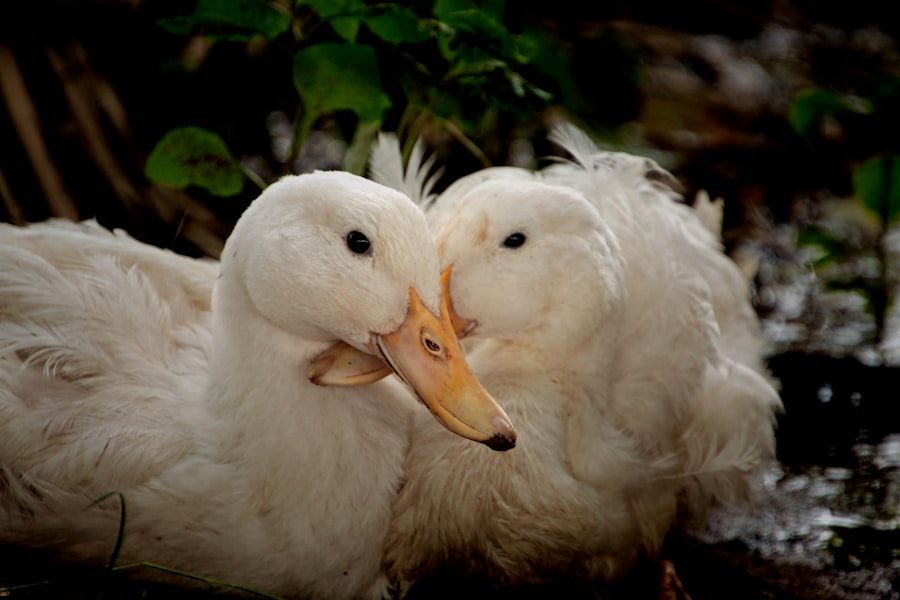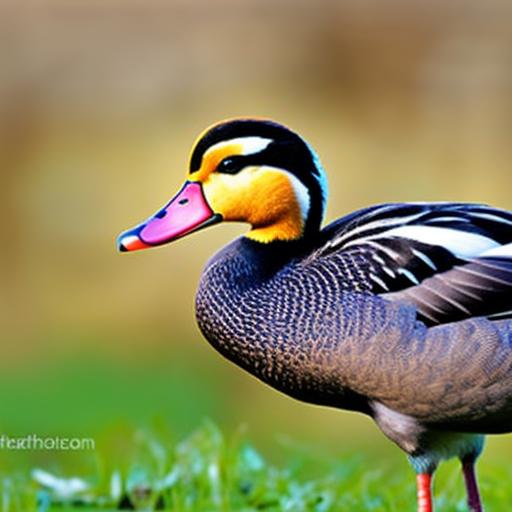Ducks have been kept as pets for centuries, with evidence of domestication dating back to ancient Egypt and Rome. While they were initially kept for their eggs and meat, ducks have also become popular pets due to their charming personalities and unique characteristics. In recent years, more and more people are choosing ducks as pets, finding joy in their playful nature and the companionship they provide.
Keeping ducks as pets offers a range of benefits. Firstly, ducks are highly social animals and can form strong bonds with their owners. They are known for their friendly and affectionate nature, often following their owners around and seeking attention. Ducks are also highly intelligent creatures, capable of learning tricks and commands. This makes them a fun and interactive pet to have around the house. Additionally, ducks are relatively low-maintenance compared to other pets. They require minimal grooming and can be easily trained to use a designated area for bathroom needs.
Key Takeaways
- Keeping ducks as pets can be a rewarding experience for those who have the time and resources to care for them.
- Popular duck breeds for pets include Pekin, Muscovy, and Khaki Campbell.
- Understanding the characteristics of different duck breeds can help you choose the right one for your home and lifestyle.
- Proper housing and feeding requirements are essential for the health and well-being of your pet duck.
- Training and socializing your pet duck can help them become well-behaved and friendly companions.
Popular Duck Breeds for Pets
There are several popular duck breeds that make excellent pets. Each breed has its own unique characteristics and appearance, allowing potential owners to choose a duck that suits their preferences.
One popular breed is the Pekin duck. Pekin ducks are known for their large size and white feathers. They have a calm and friendly temperament, making them great companions for families with children or other pets. Pekin ducks are also excellent egg layers, producing large white eggs throughout the year.
Another popular breed is the Indian Runner duck. Indian Runners are known for their upright posture and distinctive long necks. They come in a variety of colors, including white, black, fawn, and chocolate. Indian Runners are highly active and energetic, often amusing their owners with their comical running style. They are also good egg layers, making them a practical choice for those interested in both companionship and egg production.
The Khaki Campbell duck is another popular breed for pets. Khaki Campbells are medium-sized ducks with a khaki-colored plumage. They are known for their excellent egg-laying abilities, often producing up to 300 eggs per year. Khaki Campbells are also friendly and sociable, making them a great choice for families or individuals looking for a companion duck.
Understanding the Characteristics of Different Duck Breeds
When choosing a duck breed as a pet, it is important to consider their physical characteristics as well as their temperament and behavior.
In terms of physical characteristics, ducks can vary greatly in size, color, and feather type. Some breeds, like the Pekin duck, are large and have a plump body shape. Others, like the Indian Runner duck, have a slender and upright posture. Feather colors can range from white to black to various shades of brown and fawn. Some breeds also have unique feather patterns or markings.
Temperament and behavior also differ among duck breeds. Some breeds, like the Pekin duck, are known for their calm and friendly nature. They are often described as being docile and easy to handle. Other breeds, like the Indian Runner duck, are more active and energetic. They enjoy exploring their surroundings and may require more space to roam. It is important to choose a breed that matches your lifestyle and preferences in terms of temperament.
Choosing the Right Duck Breed for Your Home and Lifestyle
When choosing a duck breed as a pet, there are several factors to consider to ensure that it is the right fit for your home and lifestyle.
Firstly, consider the space you have available for your pet duck. Some breeds, like the Pekin duck, require more space due to their larger size. They may need access to a pond or a large yard where they can roam freely. Other breeds, like the Indian Runner duck, can adapt well to smaller spaces and are suitable for urban or suburban environments.
Secondly, consider the climate in your area. Some duck breeds are more cold-hardy and can tolerate colder temperatures, while others may require additional protection or heated housing during the winter months. It is important to choose a breed that can thrive in your specific climate.
Lastly, consider your own lifestyle and preferences. If you have children or other pets, you may want to choose a breed that is known for its friendly and sociable nature, such as the Pekin duck. If you are interested in egg production, you may want to choose a breed like the Khaki Campbell duck, which is known for its excellent egg-laying abilities.
Caring for Your Pet Duck: Housing and Feeding Requirements
Proper housing and feeding are essential for the health and well-being of pet ducks.
When it comes to housing, ducks require a safe and secure environment that protects them from predators and provides shelter from the elements. A duck house should be spacious enough to allow for comfortable movement and should have proper ventilation to prevent moisture buildup. It should also have a clean and dry bedding material, such as straw or wood shavings, which should be changed regularly.
Ducks also require access to water for swimming and bathing. This can be provided through a small pond or a shallow pool. It is important to ensure that the water is clean and changed regularly to prevent the spread of bacteria or parasites.
In terms of feeding, ducks have specific dietary needs that should be met to ensure their health. A balanced diet for ducks consists of a combination of commercial duck feed, fresh vegetables, and insects. Commercial duck feed should make up the majority of their diet and should be specifically formulated for ducks. Fresh vegetables, such as lettuce, spinach, and peas, can be offered as treats. Ducks also enjoy foraging for insects in their environment, so allowing them access to grassy areas can provide additional nutrition.
Health and Wellness Considerations for Pet Ducks

Like any pet, ducks can experience health issues that require attention and care. It is important to be aware of common health issues in ducks and take preventative measures to ensure their well-being.
One common health issue in ducks is respiratory infections. Ducks are susceptible to respiratory diseases, such as duck viral enteritis and avian influenza. These diseases can be spread through contact with infected birds or contaminated water sources. To prevent respiratory infections, it is important to practice good biosecurity measures, such as keeping ducks away from wild birds and regularly cleaning and disinfecting their living environment.
Another common health issue in ducks is bumblefoot, which is an infection of the foot caused by bacteria. Bumblefoot can occur when ducks are kept on hard or rough surfaces for extended periods of time. To prevent bumblefoot, it is important to provide ducks with a soft and clean bedding material and to regularly inspect their feet for any signs of infection.
Regular veterinary check-ups are also important for maintaining the health of pet ducks. A veterinarian can provide vaccinations, perform routine health checks, and offer advice on proper nutrition and care.
Training Your Pet Duck: Tips and Techniques
Training your pet duck can be a fun and rewarding experience. Ducks are highly intelligent animals and can learn a variety of tricks and commands with patience and consistency.
When training your duck, it is important to start with basic commands, such as “sit” or “stay.” Use positive reinforcement techniques, such as treats or praise, to reward your duck for following commands. Ducks are motivated by food, so using treats as a reward can be highly effective.
Consistency is key when training ducks. Set aside regular training sessions each day and keep the sessions short to maintain your duck’s attention span. Repeat commands consistently and use the same hand signals or verbal cues each time.
It is also important to be patient and understanding when training ducks. They may not learn commands as quickly as other pets, but with time and repetition, they can become proficient in a variety of tricks and behaviors.
Socializing Your Pet Duck: Interaction with Other Animals and Humans
Socialization is an important aspect of raising a pet duck. Ducks are highly social animals and thrive on interaction with both humans and other animals.
To socialize your duck with other animals, it is important to introduce them gradually and under controlled circumstances. Start by allowing supervised interactions with calm and friendly animals, such as dogs or cats. Monitor their interactions closely and intervene if any signs of aggression or stress are observed. Over time, your duck will become more comfortable with other animals and will learn to coexist peacefully.
Socializing your duck with humans is also important for their well-being. Spend time interacting with your duck on a daily basis, offering treats, gentle petting, and verbal praise. Ducks enjoy being around their owners and can form strong bonds with them. Regular socialization will help your duck feel comfortable and secure in their environment.
Common Challenges of Raising Ducks as Pets
While ducks can make wonderful pets, there are some common challenges that owners may face when raising them.
One challenge is the mess that ducks can create. Ducks produce a significant amount of waste, which can be difficult to manage, especially if they are kept indoors or in a small space. Regular cleaning and maintenance of their living environment is necessary to prevent odors and the spread of bacteria.
Another challenge is the noise that ducks can make. Ducks are known for their loud quacking, which can be disruptive in certain environments. It is important to consider the noise level when choosing a duck breed as a pet, especially if you live in close proximity to neighbors or have noise restrictions in your area.
Lastly, ducks require access to water for swimming and bathing. This can be a challenge for owners who do not have access to a pond or a suitable water source. Providing a small pool or pond for your duck can be a solution, but it requires regular cleaning and maintenance to ensure the water is clean and safe for your pet.
The Joys and Rewards of Keeping Ducks as Pets
Keeping ducks as pets can be a rewarding and fulfilling experience. They offer companionship, entertainment, and a unique charm that is hard to resist.
The benefits of keeping ducks as pets are numerous. They are social and affectionate animals that can form strong bonds with their owners. Ducks are also highly intelligent and can be trained to perform tricks and commands. Additionally, ducks are relatively low-maintenance compared to other pets, requiring minimal grooming and care.
While there are challenges in raising ducks as pets, with proper care and attention, these challenges can be overcome. The joys and rewards of keeping ducks as pets far outweigh the challenges. From their playful nature to their amusing antics, ducks bring a sense of joy and happiness to any household.
If you’re considering getting a pet duck, you might also be interested in learning about different duck breeds and their characteristics. Understanding the various breeds can help you choose the right one for your lifestyle and preferences. In a related article on Poultry Wizard, you can explore the fascinating world of duck breeds for pets. From the popular and friendly Pekin ducks to the beautiful and ornamental Indian Runner ducks, this article provides valuable insights into each breed’s temperament, size, and egg-laying capabilities. Discover more about these delightful feathered companions by clicking here.
FAQs
What are some popular duck breeds for pets?
Some popular duck breeds for pets include Pekin, Rouen, Khaki Campbell, and Muscovy.
What is the temperament of pet ducks?
Pet ducks are generally friendly and social animals. They can be trained to follow their owners and enjoy being around people.
What kind of living space do pet ducks need?
Pet ducks need a secure and spacious living space that includes a shelter for protection from the elements and predators. They also need access to water for swimming and cleaning.
What do pet ducks eat?
Pet ducks eat a diet that consists of commercial duck feed, fresh vegetables, and fruits. They also enjoy snacking on insects and worms.
Do pet ducks require any special care?
Pet ducks require regular grooming to maintain their feathers and prevent health issues. They also need access to clean water for swimming and cleaning.
Can pet ducks be trained?
Yes, pet ducks can be trained to follow commands and perform tricks. They are intelligent animals and enjoy learning new things.
What is the lifespan of pet ducks?
The lifespan of pet ducks varies depending on the breed and living conditions. On average, pet ducks can live up to 10 years or more with proper care.
Meet Walter, the feathered-friend fanatic of Florida! Nestled in the sunshine state, Walter struts through life with his feathered companions, clucking his way to happiness. With a coop that’s fancier than a five-star hotel, he’s the Don Juan of the chicken world. When he’s not teaching his hens to do the cha-cha, you’ll find him in a heated debate with his prized rooster, Sir Clucks-a-Lot. Walter’s poultry passion is no yolk; he’s the sunny-side-up guy you never knew you needed in your flock of friends!







